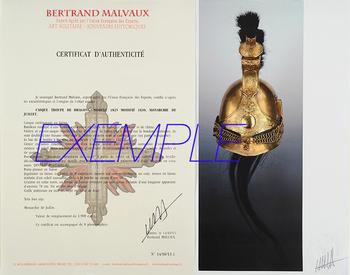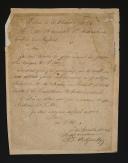
HANDWRITTEN LETTER SIGNED BY BARON DES GENETTES TO HIS MAJESTY ALEXANDER I, to request his benevolence, Wilna, December 12, 1812. 18906-51
Sold out
AUTOGRAPH SIGNED LETTER FROM BARON DESGENETTES TO HIS MAJESTY ALEXANDER I, to solicit his favor, Wilna on December 12, 1812. 18906-51
Baron desGenettes seeks the favor of His Majesty Alexander I regarding the care he has provided for the French soldiers taken prisoner for the past twenty years, as he has now fallen into the hands of his troops. Alexander I will release him (see Biography below) and have him escorted by his guards to the French outposts.
"Wilna on December 12, 1812.
To His Majesty Alexander I, Autocrat of all the Russias.
Sire,
I fell on the 9th of the current month into the hands of the troops of His Majesty.
The care that I have lavished for nearly twenty years on the soldiers who were made prisoners of France by the fortunes of war give me some rights to the benevolence of all nations.
It is on these grounds that I dare to request the protection of His Majesty.
With profound respect, Sire, of His Majesty.
The very humble and obedient servant.
signed: Bon DesGenettes".
Dimensions: 27.4 cm x 20.8 cm.
Condition: Fair. Text in good condition, foxing, tears on the edges.
BIOGRAPHY:
René-Nicolas Dufriche, Baron Desgenettes, born on May 23, 1762 in Alençon and died on February 3, 1837 in Paris, was a French military physician.
[...]
On April 6, 1807, having received orders from the Emperor to join the headquarters, his only son dying, he ceased to give him care in order to depart within twenty-four hours. In 1807, he was appointed chief physician of the Grande Armée but missed the battles of Eylau, Friedland, and Wagram. After the Peace of Tilsit, he asked to return to private life to dedicate himself entirely to his family; however, Napoleon I refused to allow such a sacrifice. Desgenettes left Berlin on leave in May 1808 and returned to Paris, from where he set off again in October to accompany the Emperor to Spain, where the latter deemed his presence necessary.
Despite his frankness and independent spirit, he was showered with favors by the Emperor, being made a knight in 1809 and a baron of the Empire in 1810. He participated in the Russian campaign, where he organized care to the best of his abilities. Captured in Vilna during the retreat from Russia on December 10, 1812, the mere mention of his name secured his freedom. Tsar Alexander I liberated him in recognition of the care he had provided to Russian soldiers and had him escorted by his Cossack guards to the French outposts in Magdeburg on March 20, 1813. He left for Paris with a secret mission from the viceroy to Napoleon, successfully completed it, and departed again in April to resume his duties as chief physician of the Grande Armée.
[...]
During the Hundred Days, he resumed his position as chief physician of the Imperial Guard and witnessed the Battle of Waterloo. He returned to Paris with the army, and Louis XVIII retained him in his positions at Val-de-Grâce on July 1, and at the Faculty of Medicine in Paris, where he taught Hygiene and was reinstated in the General Health Council of the armies in 1819 (formerly General Inspection), ceasing his functions as Inspector General only in January 1816, with the abolition of this title.
He was admitted as a member of the Royal Academy of Medicine in 1820, but was removed in 1822 due to student unrest, before being reinstated in 1830 and elected as a member of the Academy of Sciences under the July Monarchy. A portrait of him, completed in 1828 by Horace Vernet, is preserved in the museum of the Health Service of the Armed Forces at the Val-de-Grâce Abbey.
After the Revolution of 1830, Baron Desgenettes was appointed mayor of the 10th arrondissement of Paris on November 14 and held the position until the municipal elections of 1834. He was appointed Chief Physician of the Invalides on March 2, 1832.
Baron desGenettes seeks the favor of His Majesty Alexander I regarding the care he has provided for the French soldiers taken prisoner for the past twenty years, as he has now fallen into the hands of his troops. Alexander I will release him (see Biography below) and have him escorted by his guards to the French outposts.
"Wilna on December 12, 1812.
To His Majesty Alexander I, Autocrat of all the Russias.
Sire,
I fell on the 9th of the current month into the hands of the troops of His Majesty.
The care that I have lavished for nearly twenty years on the soldiers who were made prisoners of France by the fortunes of war give me some rights to the benevolence of all nations.
It is on these grounds that I dare to request the protection of His Majesty.
With profound respect, Sire, of His Majesty.
The very humble and obedient servant.
signed: Bon DesGenettes".
Dimensions: 27.4 cm x 20.8 cm.
Condition: Fair. Text in good condition, foxing, tears on the edges.
BIOGRAPHY:
René-Nicolas Dufriche, Baron Desgenettes, born on May 23, 1762 in Alençon and died on February 3, 1837 in Paris, was a French military physician.
[...]
On April 6, 1807, having received orders from the Emperor to join the headquarters, his only son dying, he ceased to give him care in order to depart within twenty-four hours. In 1807, he was appointed chief physician of the Grande Armée but missed the battles of Eylau, Friedland, and Wagram. After the Peace of Tilsit, he asked to return to private life to dedicate himself entirely to his family; however, Napoleon I refused to allow such a sacrifice. Desgenettes left Berlin on leave in May 1808 and returned to Paris, from where he set off again in October to accompany the Emperor to Spain, where the latter deemed his presence necessary.
Despite his frankness and independent spirit, he was showered with favors by the Emperor, being made a knight in 1809 and a baron of the Empire in 1810. He participated in the Russian campaign, where he organized care to the best of his abilities. Captured in Vilna during the retreat from Russia on December 10, 1812, the mere mention of his name secured his freedom. Tsar Alexander I liberated him in recognition of the care he had provided to Russian soldiers and had him escorted by his Cossack guards to the French outposts in Magdeburg on March 20, 1813. He left for Paris with a secret mission from the viceroy to Napoleon, successfully completed it, and departed again in April to resume his duties as chief physician of the Grande Armée.
[...]
During the Hundred Days, he resumed his position as chief physician of the Imperial Guard and witnessed the Battle of Waterloo. He returned to Paris with the army, and Louis XVIII retained him in his positions at Val-de-Grâce on July 1, and at the Faculty of Medicine in Paris, where he taught Hygiene and was reinstated in the General Health Council of the armies in 1819 (formerly General Inspection), ceasing his functions as Inspector General only in January 1816, with the abolition of this title.
He was admitted as a member of the Royal Academy of Medicine in 1820, but was removed in 1822 due to student unrest, before being reinstated in 1830 and elected as a member of the Academy of Sciences under the July Monarchy. A portrait of him, completed in 1828 by Horace Vernet, is preserved in the museum of the Health Service of the Armed Forces at the Val-de-Grâce Abbey.
After the Revolution of 1830, Baron Desgenettes was appointed mayor of the 10th arrondissement of Paris on November 14 and held the position until the municipal elections of 1834. He was appointed Chief Physician of the Invalides on March 2, 1832.
Reference :
18906-51

Next update Friday, February 13 at 13:30 PM
FOR ALL PURCHASES, PAYMENT IN MULTIPLE CHECKS POSSIBLE
bertrand.malvaux@wanadoo.fr 06 07 75 74 63
SHIPPING COSTS
Shipping costs are calculated only once per order for one or more items, all shipments are sent via registered mail, as this is the only way to have proof of dispatch and receipt.
For parcels whose value cannot be insured by the Post, shipments are entrusted to DHL or Fedex with real value insured, the service is of high quality but the cost is higher.
RETURN POLICY
Items can be returned within 8 days of receipt. They must be returned by registered mail at the sender's expense, in their original packaging, and in their original condition.
AUTHENTICITY
The selection of items offered on this site allows me to guarantee the authenticity of each piece described here, all items offered are guaranteed to be period and authentic, unless otherwise noted or restricted in the description.
An authenticity certificate of the item including the description published on the site, the period, the sale price, accompanied by one or more color photographs is automatically provided for any item priced over 130 euros. Below this price, each certificate is charged 5 euros.
Only items sold by me are subject to an authenticity certificate, I do not provide any expert reports for items sold by third parties (colleagues or collectors).
FOR ALL PURCHASES, PAYMENT IN MULTIPLE CHECKS POSSIBLE
bertrand.malvaux@wanadoo.fr 06 07 75 74 63
An authenticity certificate of the item including the description published on the site, the period, the sale price, accompanied by one or more color photographs is automatically provided for any item priced over 130 euros. Below this price, each certificate is charged 5 euros.
Only items sold by me are subject to an authenticity certificate, I do not provide any expert reports for items sold by third parties (colleagues or collectors).
